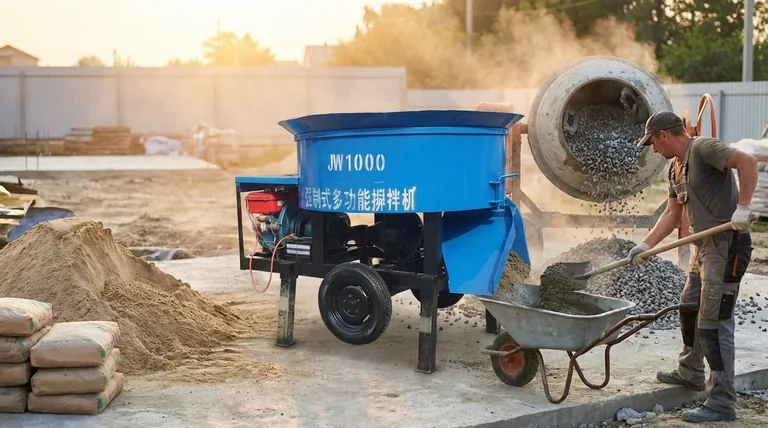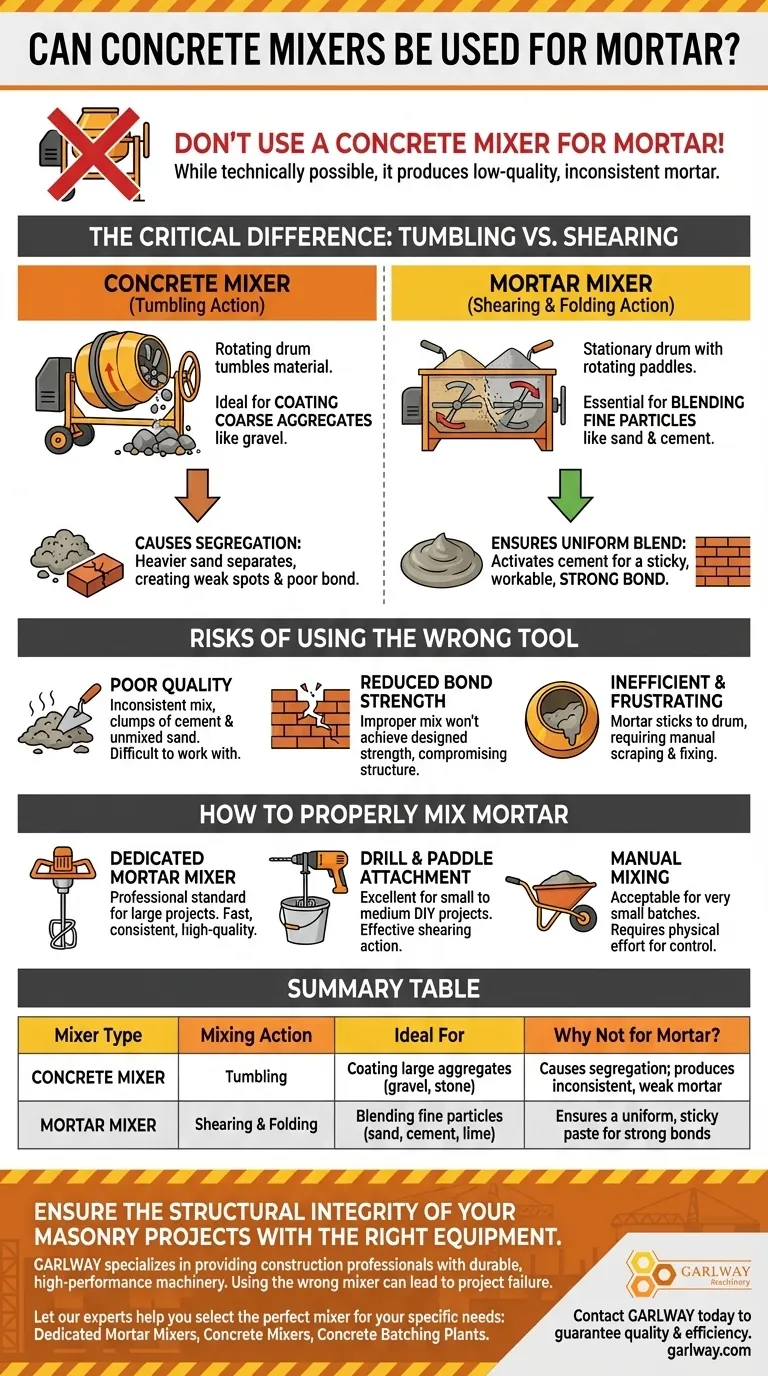While technically possible in an emergency, you should not use a concrete mixer for mortar. The fundamental mixing actions are completely different, and using the wrong machine will produce a low-quality, inconsistent mortar. A concrete mixer tumbles material, which is ideal for coating coarse aggregates, but mortar requires a shearing action to properly blend its fine components.
The core issue isn't the machine's power but its method. Concrete mixers tumble, which separates the fine particles in mortar. Mortar mixers shear and force materials together, creating the consistent, sticky paste required for strong masonry bonds.

The Critical Difference: Tumbling vs. Shearing
Understanding why these tools are not interchangeable comes down to the physics of what you are mixing. Concrete and mortar are fundamentally different materials with different requirements.
How a Concrete Mixer Works
A concrete mixer uses a rotating drum with internal fins. This design lifts the material—including large aggregates like gravel and stone—and tumbles it back down.
This tumbling action is perfect for coating those large, heavy aggregates with a layer of cement paste. Think of it like a large clothes dryer, constantly lifting and dropping the contents.
How a Mortar Mixer Works
A mortar mixer, often called a "paddle mixer," works on a completely different principle. The drum or trough remains stationary while paddles rotate inside.
This creates a shearing and folding action. The paddles force the fine sand, cement, and lime particles together, smearing them against each other and the sides of the drum. This ensures a complete and uniform blend, which is essential for activating the cement and creating a sticky, workable consistency.
Why the Actions Aren't Interchangeable
If you put mortar ingredients into a concrete mixer, the tumbling action causes segregation. The heavier sand will separate from the lighter cement and lime, preventing a homogenous mix.
The smooth interior of the drum lacks the shearing force needed to properly blend the fine particles, resulting in clumps, weak spots, and poor workability.
The Risks of Using the Wrong Tool
Using a concrete mixer for mortar isn't just inefficient; it directly compromises the quality and safety of your work.
Poor Mortar Quality
The final product will be inconsistent. You will find pockets of unmixed sand or clumps of pure cement, leading to a gritty, unworkable texture. This makes laying bricks or blocks extremely difficult.
Reduced Bond Strength
The primary job of mortar is to create a powerful bond. Improperly mixed mortar will not achieve its designed strength, drastically reducing the integrity and durability of the entire structure.
Inefficient and Frustrating
The mortar will tend to stick to the sides of the drum instead of mixing properly. You will spend more time scraping the drum and trying to manually fix the poor mix than you would have mixing it correctly by hand.
How to Properly Mix Mortar
For a strong, reliable result, you must use a tool designed for the job.
The Dedicated Mortar Mixer
For any project larger than a small repair, this is the professional standard. It guarantees a fast, consistent, and high-quality mix every time, saving immense labor and ensuring structural integrity.
Drill and Paddle Attachment
For small to medium-sized DIY projects, a powerful, low-speed drill with a paddle mixer attachment is an excellent choice. It uses the same shearing principle as a large mixer and is highly effective for mixing a single bucket at a time.
Manual Mixing
For very small batches, the traditional method of using a wheelbarrow or mixing tub and a sturdy hoe is perfectly acceptable. It requires physical effort but provides complete control over the mix.
Making the Right Choice for Your Project
Your project's scale and structural requirements should dictate your choice of equipment.
- If your primary focus is a professional masonry job: You must use a dedicated mortar mixer. The quality and efficiency are non-negotiable for structural work.
- If your primary focus is a small repair or a DIY wall: A drill and paddle attachment offers the best balance of cost, convenience, and quality for your mix.
- If your only option is a concrete mixer: Use it only for non-structural applications like a small garden border and be prepared for a difficult, low-quality result.
Choosing the correct mixer is a foundational step to ensuring the strength and longevity of your work.
Summary Table:
| Mixer Type | Mixing Action | Ideal For | Why Not for Mortar? |
|---|---|---|---|
| Concrete Mixer | Tumbling | Coating large aggregates (gravel, stone) | Causes segregation; produces inconsistent, weak mortar |
| Mortar Mixer | Shearing & Folding | Blending fine particles (sand, cement, lime) | Ensures a uniform, sticky paste for strong bonds |
Ensure the structural integrity of your masonry projects with the right equipment.
GARLWAY specializes in providing construction professionals and contractors with durable, high-performance machinery. Using a concrete mixer for mortar can lead to weak bonds and project failure. For reliable results, you need a tool designed for the job.
Let our experts help you select the perfect mixer for your specific needs:
- Dedicated Mortar Mixers for professional masonry work
- Concrete Mixers for your aggregate-heavy projects
- Concrete Batching Plants for large-scale production
Contact GARLWAY today to discuss your project requirements and get a quote on the machinery that will guarantee quality and efficiency on your job site.
Visual Guide

Related Products
- Ready Mixer Machine for Construction Ready Mix Machinery
- Commercial Construction Mixer Machine for Soil Cement Mixing Concrete
- Auto Concrete Cement Mixer Machine New
- HZS90 Large Multiquip Concrete Mixers for Construction
- Construction Products Concrete Plant Machine Mixing Concrete Mixer
People Also Ask
- What are volumetric mixers and their advantages? Achieve On-Demand Concrete with Zero Waste
- What industry solutions utilize drum concrete mixers? Beyond Construction to Diverse Blending
- What is a concrete mixer and what are its components? A Complete Guide to Efficient Mixing
- What are the benefits of a concrete mixer? Boost Efficiency, Quality & Control
- What are the advantages of flat-mouth mixers in terms of mixing efficiency? Achieve Superior Concrete Quality
- What are pan mixers and their key benefits? Achieve Superior Concrete Quality for Precast & Stiff Mixes
- What industries commonly use industrial mixers? A Guide to Robust Material Processing
- What quality assurance measures are taken for concrete lift machines before delivery? Ensure Safety & Reliability



















